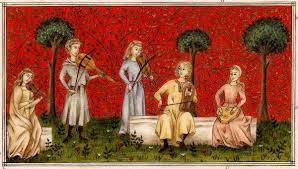
The Middle Age is well known as the era of the chiaroscuros of knowledge. The access to the means of information, to books, was cloistered in monasteries. The Church owned the knowledge. This is why, nowadays, it is unknown to us how exactly music of the beginning of the Middle Ages sounded. However, some musicians and English experts, have recently published a piece, which was reconstructed from a manuscript of the 11 century.
18 july 2016
This page/music sheet, lost for 142 years and rediscovered only some days ago, allowed three researchers to rewrite this music just like they thought it should sound in those days.
Sam Barrett, of Cambridge University, has worked, for more than 20 years to recover the melodies of the “Cambridge Songs” of the 11 century. These are the final part of an anthology of texts in Latin. This is the manuscript from which a key page has been recovered. In 1982, a page of this manuscript was found by an English expert, who was visiting a library in Frankfurt (Germany). Its disappearance was due to the fact that in 1840, a German scholar had visited Cambridge, tearing out a page of the manuscript of the “Cambridge Songs”, and taking it with him to Germany. The chants came from Rhineland.
Recently, a group has performed this music in Cambridge, for the first time in 1,000 years. The melody was added to the pages of the masterpiece of the roman philosopher Boethius named “Consolation of Philosophy”, written in the 6 century, when he was under house arrest waiting for his execution as he was accused of offences of treason.
The experts do not know if the Christian philosopher composed music for his magnum opus, although in fact, he wrote about music in other documents. Nonetheless, people from medieval times did indeed compose music for the piece of poetry named “Consolation of Philosophy” and for the verses of other authors.
The Consolidation of Philosophy is considered as the last great work of the classical period. It was one of the most read and influential book of the Middle Ages. It is about the existence of evil powers in the world of God, the fickleness of fortune and the natures of God and hapiness.
It is necessary to remember that medieval composers wrote many of the passages by the classics (Virgil or Horace, the recovery of Aristotle...), by late ancient authors, also medieval texts, and love songs and lamentations. Nevertheless, a musician from our present times cannot use a medieval music piece, read it or perform it because some of the neume hues are unknown, that is to say, how sharp or deep these sounds were. In the current musical scale, the tone is measured by writing the deeper notes in the lower part of the staff and the sharper note in the upper lines of the staff.
The mystery about the way the form music took some centuries ago, is thus, absolute. In between the 9 and 13 century, composers wrote music in neumes, different from the notes we know nowadays. Apart from neumes, they trusted the good memory of musicians to remember and communicate to other performers the melodies (this is why the Mester de Juglaría was so important in the transmission of popular culture for generations).
“This sheet in particular, ‘accidentally’ torn out in the Library of Cambridge University by a German scholar in the 1840, is a key piece in the puzzle, as the intention is to recover these songs”, explains Dr Barrett. “After rediscovering the sheet of the Cambridge Songs, what was left to do was taking a final step into sound. We have remains of lost songs repertoires , but we did not have the auditory reminiscences in which they were sustained. We know the profiles of the melodies and many details of how they were sung, but not the precise tones they were made of”.
Dr Barrett rehearsed fragments of the melody for the “Consolation of Philosophy” by Boethius, he has also worked with Benjamin Bagby, of the Lost Songs Project, who also is a member of Sequentia, a music trio that has recovered other musical songs. The Lost Songs Project rescued melodies from a very remote past, among them Beowulf and Carmina Burana.








